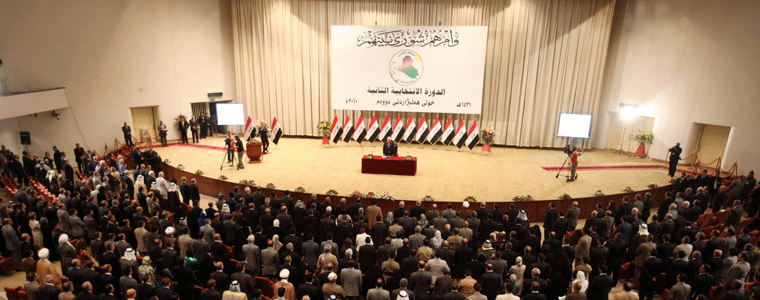USIP Helping Iraqi Minorities Find their Political Voice
The U.S. Institute of Peace (USIP) is helping vulnerable Iraqi minority groups to organize themselves in a project that is creating the means for them to more effectively advocate for their rights and interests in Iraq’s turbulent political scene.

The U.S. Institute of Peace (USIP) is helping vulnerable Iraqi minority groups to organize themselves in a project that is creating the means for them to more effectively advocate for their rights and interests in Iraq’s turbulent political scene.
The newly organized minorities recently achieved an impressive political success, convincing Iraq’s parliament to embrace an important change in federal budgeting procedures. The change, adopted on February 23 by the Council of Representatives in Baghdad, requires provincial governments to distribute most of their construction and development funds on the basis of population, countering a tendency in some provinces to deprive minority areas of equal benefits from the infrastructure spending.
Jason Gluck, USIP’s senior rule of law adviser, called it “a success for USIP’s Iraq Minority Project and a potentially significant impact on the lives of Iraqi minorities.”
The four groups involved in the program include three religious minorities—Christians, Yazidis and Sabean-Mandeans—and one ethnic minority that is Muslim: Shebaks. Each of the four groups represents less than one percent of Iraq’s population, and their numbers have been falling. According to Minority Rights Group International, Shebaks number between 200,000 and 500,000, while only 5,000 Sabean-Mandeans remain in Iraq. The population of Yazidis has reportedly fallen from 700,000 to 500,000 amid emigration and targeted attacks. Christians numbered between 800,000 and 1.4 million in 2003; some 500,000 remain, according to the U.S. Commission on International Religious Freedom (USCIRF). Adding to the pressures, militants have been stepping up terrorist attacks on the groups and their places of worship in recent years.
“These are vulnerable and marginalized communities, probably more so today than before 2003,” said Gluck. “Our goal is to bring these communities together to help them identify common concerns and to create sustainable and self-reliant mechanisms to achieve those goals.”
Historically, the minority groups have not built up significant cooperation among themselves. They also contend with internal political differences, along with the entrenched problems of discrimination in education and employment. Violence against the minority communities increased dramatically following the 2003 invasion, and it continues to cause massive displacement. That is elevating concern that emigration could ultimately lead to the assimilation and even outright disappearance of some minority groups. Meanwhile, the threat of violence is preventing youth and others from seeking education and employment outside their communities and is regularly used to intimidate minorities who participate in politics.
The net result has been to prevent minority groups from communicating their goals to the majority and have left them vulnerable to exploitation by the larger political parties.
USIP began addressing the problem in January 2010 by launching a series of dialogues with political and civil society leaders from the four communities, an effort done in cooperation with the Institute for International Law and Human Rights.
Those dialogues led to a decision to form two groups dedicated to promoting equality and non-discrimination, as well as greater participation in government and more self-governance.
One was an umbrella civil society organization, the Alliance of Iraqi Minorities (AIM). The other was the Parliamentary Minority Caucus, minority-group members of Iraqi lawmakers from various political parties. USIP has provided the AIM and the Caucus with a variety of technical, organizational and financial support. USIP’s efforts have been geared toward building up the two groups’ organizational capacity for collective advocacy and to advising on specific projects that would serve the needs of these communities. USCIRF cited USIP’s work to build up the capabilities of the Caucus in its 2012 annual report, released in March.
This January, USIP helped convene a meeting drawing together the lawmakers in the Minority Caucus with representatives of AIM. The AIM members were able to demonstrate a dramatic drop-off of budgetary expenditures in minority-heavy areas of Nineveh Province since 2010, with a new provincial council instead shifting funding to projects benefitting the Nineveh capital of Mosul. The Caucus pressed the issue in parliament, succeeding in February in persuading the Council of Representatives to direct provincial councils to spend 80 percent of construction and development funds in accord with population—a result that should increase projects in minority areas in Nineveh and elsewhere in Iraq.
The Caucus led an effort last year to amend a draft law that would have required security personnel to take into account Sharia (Islamic law) when conducting law-enforcement activities. The compromise reached in parliament added democracy and human rights to Sharia as principles that should guide and constrain law-enforcement conduct.
The Caucus has quickly developed a meaningful presence in the Iraqi parliament. “Whenever an issue related to minorities comes up during the plenary session, the speaker asks minority representatives to discuss it among themselves and decide on it,” said Nahla Arif, a USIP field officer based in Baghdad.
With USIP’s support, AIM has decided to pursue a project to reform Iraqi elementary and intermediate school curriculum, with an emphasis on peaceful coexistence and partnership between minorities and the majority as part of Iraq’s national culture. AIM recently hired 12 specialists to review texts in history, geography, civic education and Arabic language for children in grades five through nine. The experts, along with AIM members, have met with Iraqi Ministry of Education officials to discuss their recommendations. “AIM is now recognized as the credible source of information on minorities in Iraq for the Ministry of Education,” said Arif.
AIM is also embarking on a media outreach project to increase awareness in each minority community about other minorities, as well as across Iraqi society in general.
Said Gluck, “The lesson for all Iraqis is one of tolerance, inclusion and national cohesion.”
Explore Further
- Vulnerable Iraqi Minorities Making Gains with USIP Help
News Feature | December 2012



